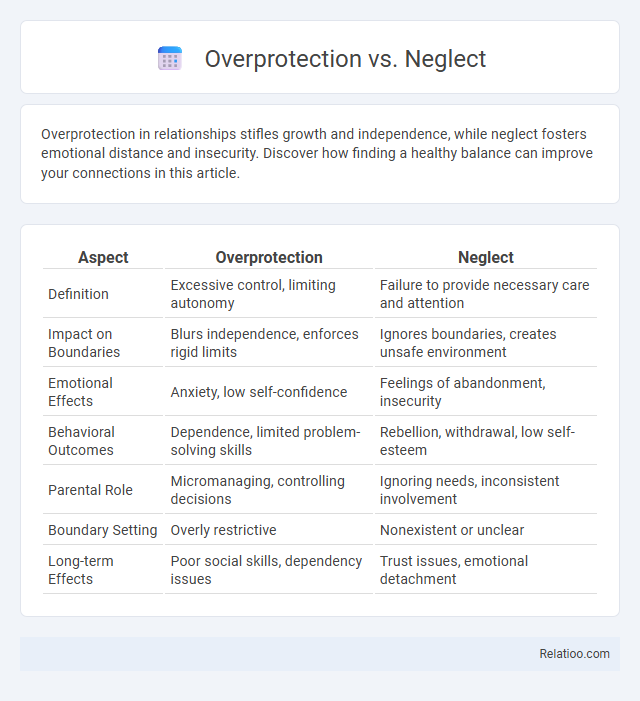Overprotection in relationships stifles growth and independence, while neglect fosters emotional distance and insecurity. Discover how finding a healthy balance can improve your connections in this article.
Table of Comparison
| Aspect | Overprotection | Neglect |
|---|---|---|
| Definition | Excessive control, limiting autonomy | Failure to provide necessary care and attention |
| Impact on Boundaries | Blurs independence, enforces rigid limits | Ignores boundaries, creates unsafe environment |
| Emotional Effects | Anxiety, low self-confidence | Feelings of abandonment, insecurity |
| Behavioral Outcomes | Dependence, limited problem-solving skills | Rebellion, withdrawal, low self-esteem |
| Parental Role | Micromanaging, controlling decisions | Ignoring needs, inconsistent involvement |
| Boundary Setting | Overly restrictive | Nonexistent or unclear |
| Long-term Effects | Poor social skills, dependency issues | Trust issues, emotional detachment |
Understanding Parental Overprotection
Parental overprotection involves excessive control and limitation of a child's independence, often hindering their ability to develop essential life skills and emotional resilience. Unlike neglect, which entails a lack of attention or care, overprotection restricts autonomy, leading to anxiety and dependence in children. Recognizing the fine line between protective parenting and overprotection is crucial for fostering balanced growth and healthy self-esteem.
Signs and Effects of Neglect in Children
Signs of neglect in children include poor hygiene, malnutrition, frequent absences from school, and delayed developmental milestones. Effects of neglect often manifest as emotional withdrawal, attachment disorders, cognitive impairments, and increased risk of mental health issues such as anxiety and depression. Chronic neglect can severely impact a child's brain development and social functioning, leading to long-term behavioral and academic challenges.
Psychological Impact of Overprotective Parenting
Overprotective parenting can lead to increased anxiety and reduced problem-solving skills in children, hindering their emotional resilience and independence. Your child may struggle with decision-making and social interactions due to a lack of exposure to challenges necessary for healthy development. This psychological impact contrasts with neglect, where emotional neglect often results in attachment issues and low self-esteem.
Long-Term Consequences of Neglectful Parenting
Neglectful parenting can lead to long-term consequences such as emotional instability, poor social skills, and increased risk of mental health disorders. Your child's development may be severely impacted, resulting in difficulties forming healthy relationships and managing stress. Recognizing and addressing neglect early is crucial for fostering resilience and promoting healthier outcomes.
Balancing Safety and Independence in Child Rearing
Balancing safety and independence in child rearing requires avoiding extremes such as overprotection, which can stifle your child's development, and neglect, which can expose them to harm and insecurity. Providing appropriate guidance while encouraging autonomy helps children build confidence and resilience. Prioritizing a nurturing environment that supports exploration and boundaries fosters well-rounded growth and emotional well-being.
Risk Factors for Overprotection and Neglect
Risk factors for overprotection include parental anxiety, lack of parenting knowledge, and cultural pressures that emphasize safety over independence, leading to limited child autonomy and development. Neglect is often rooted in caregiver substance abuse, mental health issues, poverty, and social isolation, resulting in unmet basic needs and emotional deprivation. Both overprotection and neglect negatively impact a child's emotional resilience and social skills by restricting healthy coping mechanisms or failing to provide essential care.
Emotional Development: Overprotection vs Neglect
Overprotection often stifles a child's emotional growth by limiting opportunities to face challenges and develop resilience, while neglect deprives children of essential emotional support and attachment needed for healthy psychological development. Children experiencing overprotection may struggle with anxiety and dependence, whereas those facing neglect often exhibit emotional detachment and difficulty regulating feelings. Balancing parental involvement is crucial to fostering secure emotional development and adaptive coping skills.
Strategies to Avoid Overprotective Tendencies
Balancing child-rearing approaches involves recognizing the fine line between overprotection, neglect, and appropriate care, ensuring your child develops independence and resilience. Strategies to avoid overprotective tendencies include setting clear boundaries while encouraging problem-solving skills and allowing age-appropriate risks to foster confidence. Supporting your child's autonomy helps prevent stifling growth and promotes emotional and social development essential for lifelong success.
Healing from Past Neglect: Steps for Parents and Children
Healing from past neglect requires intentional steps such as establishing consistent routines, fostering open communication, and seeking professional support like therapy to rebuild trust and security. You can promote emotional resilience by practicing empathy, setting healthy boundaries, and encouraging positive self-expression in your child. Prioritizing these strategies helps break the cycle of neglect and overprotection, contributing to healthier parent-child relationships.
Building Healthy Parent-Child Relationships
Balancing overprotection and neglect is crucial for building healthy parent-child relationships, as overprotection can limit your child's independence while neglect can hinder emotional development. Establishing clear boundaries without micromanaging fosters trust and resilience, helping children develop autonomy and confidence. Responsive parenting that provides support without control promotes secure attachment and long-term emotional wellbeing.

Infographic: Overprotection vs Neglect
 relatioo.com
relatioo.com